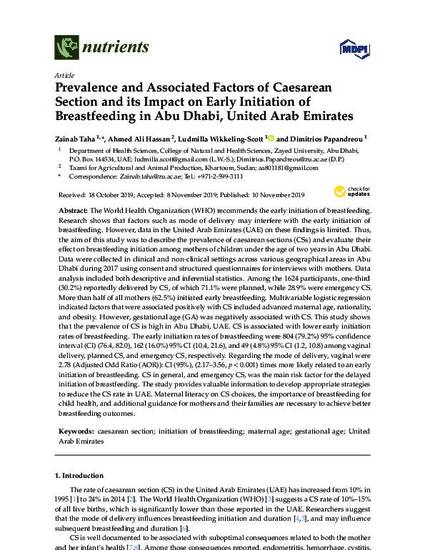
© 2019 by the authors. Licensee MDPI, Basel, Switzerland. The World Health Organization (WHO) recommends the early initiation of breastfeeding. Research shows that factors such as mode of delivery may interfere with the early initiation of breastfeeding. However, data in the United Arab Emirates (UAE) on these findings is limited. Thus, the aim of this study was to describe the prevalence of caesarean sections (CSs) and evaluate their effect on breastfeeding initiation among mothers of children under the age of two years in Abu Dhabi. Data were collected in clinical and non-clinical settings across various geographical areas in Abu Dhabi during 2017 using consent and structured questionnaires for interviews with mothers. Data analysis included both descriptive and inferential statistics. Among the 1624 participants, one-third (30.2%) reportedly delivered by CS, of which 71.1% were planned, while 28.9% were emergency CS. More than half of all mothers (62.5%) initiated early breastfeeding. Multivariable logistic regression indicated factors that were associated positively with CS included advanced maternal age, nationality, and obesity. However, gestational age (GA) was negatively associated with CS. This study shows that the prevalence of CS is high in Abu Dhabi, UAE. CS is associated with lower early initiation rates of breastfeeding. The early initiation rates of breastfeeding were 804 (79.2%) 95% confidence interval (CI) (76.4, 82.0), 162 (16.0%) 95% CI (10.4, 21.6), and 49 (4.8%) 95% CI (1.2, 10.8) among vaginal delivery, planned CS, and emergency CS, respectively. Regarding the mode of delivery, vaginal were 2.78 (Adjusted Odd Ratio (AOR)): CI (95%), (2.17–3.56, p < 0.001) times more likely related to an early initiation of breastfeeding. CS in general, and emergency CS, was the main risk factor for the delayed initiation of breastfeeding. The study provides valuable information to develop appropriate strategies to reduce the CS rate in UAE. Maternal literacy on CS choices, the importance of breastfeeding for child health, and additional guidance for mothers and their families are necessary to achieve better breastfeeding outcomes.
- Caesarean section,
- Gestational age,
- Initiation of breastfeeding,
- Maternal age,
- United Arab Emirates
Available at: http://works.bepress.com/dimitrios-papandreou/38/